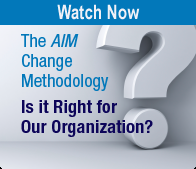Change management models are all theoretically sound, so the challenge is to find one that will really increase the likelihood of benefit realization for your projects. After all, it's not just about finding a change management model for the HR, OD, or Change Management professionals. 
If you are in the market for a change management model or methodology for your organization, here are three important questions for you to consider:
1. Is the change management model "business-driven?"
One of the reasons why we find that leaders are not as interested in "change management" as we would hope is because they view it as something that belongs in the "HR box" rather than in the "business systems" box. That's one of the reasons why when we talk to executives we don't even talk about our "change management model."
Instead, we focus on the language of leaders, and talk about how this process will help them implement faster, at reduced expense, with fewer resources, or at higher quality. This is the language of business.
We also emphasize measurement of strategic changes (on time, on budget, all business, technical and human objectives met) as a business imperative. It's not about doing "AIM" (our proprietary Accelerating Implementation Methodology) it's about speed of implementation and the importance of speed in business terms. For example, those organizations that implement faster have a competitive edge in t
he marketplace.
Other methodologies are more conceptual and theoretical, and really don't speak in the vernacular of business.
Even if the methodology is rooted in research (and most are) that research has to be translated into business language, not change management language. The data-based foundations of AIM such as the Implementation History Assessment and the Implementation Risk Forecast help to bridge the divide between the change management model principles and concepts and business realities.
2. Is the change management model tactical and operationally-focused?
It's not enough to have a change management model that is conceptually-sound and research-based. The model really needs to be tactical, strategic, and operationally-focused.
The fact that the change management methodology is tactical is not just important for the project team or the HR and change management professionals. The model has to help supervisors, managers, and leaders get guidance on the actions they should be taking every day in their own business units and departments.
In other words, the value of the change management model is that it is immediately translated into actions to be taken to support the implementation. That's why just having checklists and templates isn't enough. These can be completed as a "check the box" activity without really getting to the heart of daily actions by leaders!
So it's not about rigid adherence to a change management methodology. The real value of the change management model is that it guides the organization on what to do depending on what is going on in the moment.
While a change management model is intended to help ensure that the necessary activities are completed, the nature of change is that the greatest value is often from unplanned interventions that take place in the moment. And the principles of the methodology are the guide on what to actually do!
3. Is the change management model flexible and scalable?
Many organizational change models are focused on helping individuals with adapting in the face of extensive organizational change, which is clearly important. However, from a business perspective the challenge is how to get changes implemented given all the realities of organizational structure and culture. The complexity of most organizations (matrix structures, global reach, conflicting leadership agendas, risk-averse cultures) combined with the complexity of transformational change calls for more than a simple series of checklists and templates.
Your change management model needs to be sophisticated enough to match this level of complexity and the requirements of systemic change!
Given the need for speed, your change management model also needs to have the flexibility to be adaptable and "fit for purpose." Our AIM change management methodology isn't about elegance or a rigid adherence to a pre-prescribed set of checklists-- it is principle driven and designed to have the flexibility to meet individual project needs as well as large-scale, enterprise-wide change.
If you're in the market for a change management model, these questions are critically important.


